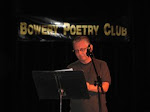On Wednesday, March 2, Bodega Pop Live on WFMU's Give the Drummer Radio took a tour of the 70s and early 80s work of one of Soviet Russia's most thrilling and enigmatic figures: Yuri Morozov (aka Yury Morozov).
Russian studio engineer / music producer Yuri Morozov (Юрий Морозов, 1948 – 2006) led a series of not-so-secret double lives: he was also a poet, novelist, musician, singer-songwriter, composer, visual artist, and hippie scofflaw. He was not exactly Russia’s John Lennon, as some have claimed, although Lennon was one of many significant influences. He was Russia’s Lennon & McCartney, R. Stevie Moore, William Onyeabor, Bob Dylan, Konrad Plank, David Byrne, Captain Beefheart, Czesław Niemen, Brian Eno, Ryuichi Sakamoto, and David Bowie all wrapped up into one.
Morozov recorded a reputed 60 albums—60 studio albums—the bulk of them in the 1970s and 80s, self-released and distributed magnitizdat-style. The earliest were recorded in his small, cluttered St. Petersburg apartment; these include the legendary Land of the Gnomes (1972), Cherry Orchard of Jimi Hendrix (1973) and Cretin Wedding (1976); beginning in 1977 he courted imprisonment by recording his work illegally, after hours, in the state-run studio where he worked. The next year he recorded the first of at least three album-length electronic music experiments—but rather than austere collections of purely synthesized chirps, bleeps and warbles, The Inexplicable (1978) and its follow-ups, Spells and Human Extinction (both 1979) were trippy psychedelic masterpieces with shrieking guitars, human grunts and squeals, and endlessly mutating and bizarre synth landscapes and textures.
